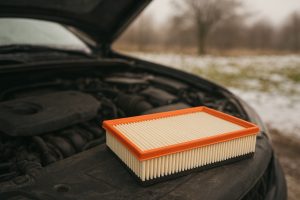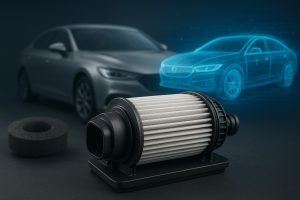For many vehicle owners, driving habits change with the seasons. Some cars spend most of the year in storage, only to be brought out during summer or winter months. Whether you drive a convertible that only hits the road in warm weather, or a 4×4 kept for winter’s toughest conditions, filter maintenance is one of the most critical aspects to keep your vehicle running smoothly and reliably.
Filters — whether air, cabin, fuel, or oil — serve as protective barriers that prevent harmful particles, dust, and contaminants from damaging the engine and other systems. For seasonal drivers, understanding when and how to check and replace filters is especially important, since long periods of inactivity can have as much of an impact as high mileage.
If you’re planning to prepare your vehicle for the season ahead, you can always buy Filters online to ensure your car remains in top condition.
Why Seasonal Driving Affects Filters

Seasonal drivers face unique conditions that affect how filters perform and degrade.
Common Issues:
-
Moisture buildup: Cars stored in damp garages may have filters that trap excess moisture, reducing efficiency.
-
Dust and pollen: Summer-only vehicles often encounter dusty roads, requiring more frequent air and cabin filter checks.
-
Cold conditions: Winter vehicles may experience clogged filters from slush, road salt, and debris.
-
Storage residue: Inactivity allows contaminants in fuel or oil to settle and clog filters.
Types of Filters and Their Role
| Filter Type | Function | Seasonal Concerns | Replacement Interval* |
|---|---|---|---|
| Engine Air Filter | Keeps dirt, dust, and debris from entering the engine combustion chamber. | Dust accumulation in summer driving. | 15,000–30,000 km or 1 year. |
| Cabin Air Filter | Protects passengers from dust, pollen, and pollutants inside the cabin. | Pollen-heavy seasons (spring/summer). | 15,000–20,000 km or annually. |
| Oil Filter | Cleans contaminants from the engine oil. | Degradation from old oil during storage. | With every oil change (6–12 mo.). |
| Fuel Filter | Ensures clean fuel delivery to the engine. | Risk of clogging from stale fuel in storage. | 30,000–50,000 km or as needed. |
*Intervals may vary depending on manufacturer recommendations.
Maintenance Tips for Seasonal Drivers
Before Storing Your Car:
-
Replace Oil and Oil Filter – Old oil becomes acidic and can corrode the engine.
-
Fill Up the Tank – Prevents condensation that contaminates the fuel filter.
-
Check Cabin Filter – Replace if clogged with dirt or pollen before storage.
-
Clean Air Filter – Prevents rodents or debris from blocking the intake.
Before Taking Your Car Out of Storage:
-
Inspect Air Filter – Look for dirt, dust, or insect nests.
-
Check Fuel Filter – Ensure no clogs from old fuel deposits.
-
Examine Cabin Filter – Mold and moisture buildup can reduce air quality.
-
Inspect Oil Filter – Replace with fresh oil if storage exceeded 6 months.
Signs Your Filters Need Replacement
Even with low mileage, seasonal drivers should watch for these warning signs:
-
Reduced engine performance or sluggish acceleration.
-
Unpleasant odors inside the cabin, especially musty smells.
-
Decreased fuel efficiency due to clogged air or fuel filters.
-
Engine misfires caused by restricted airflow or poor fuel delivery.
-
Unusual engine noises, such as knocking or rough idling.
Seasonal Driving Scenarios and Filter Care
| Seasonal Use Case | Key Filters to Prioritize | Notes |
|---|---|---|
| Summer-only sports car | Air and cabin filters | Dust and pollen are the main culprits. |
| Winter-only SUV/4×4 | Oil and fuel filters | Cold starts stress the lubrication and fuel flow. |
| Classic car (stored) | Oil, fuel, and air filters | Long inactivity increases contamination risks. |
| Daily driver in all seasons | All filters equally | Balanced replacement intervals recommended. |
Best Practices for Seasonal Filter Maintenance
-
Always follow manufacturer recommendations for replacement intervals.
-
Use OEM-quality filters for proper fit and efficiency.
-
Keep a log of filter changes to avoid unnecessary replacements.
-
Combine filter replacement with seasonal servicing for efficiency.
-
Store replacement filters in a dry, sealed environment until use.
Future Trends in Automotive Filters

Automotive filters are evolving to meet stricter performance and environmental demands:
-
High-efficiency particulate filters (HEPA) for cabin air in urban environments.
-
Nano-fiber filters that capture smaller particles with less airflow restriction.
-
Extended-life oil filters designed for long-drain synthetic oils.
-
Smart filters with sensors that notify drivers when service is required.
Conclusion
For seasonal drivers, filters play an essential role in ensuring both the performance of the vehicle and the comfort of its passengers. Unlike daily drivers, cars that sit in storage or face extreme seasonal conditions require careful attention to filter maintenance. Whether it’s preventing dust, pollen, or moisture from causing damage, or ensuring clean oil and fuel delivery, filters are the unsung heroes of seasonal vehicle reliability.
To prepare your vehicle for the season ahead, it’s always a good idea to buy Filters online so you have the right parts ready when you need them. Proper filter maintenance not only prolongs your vehicle’s life but also ensures you enjoy every mile when it’s finally time to hit the road.